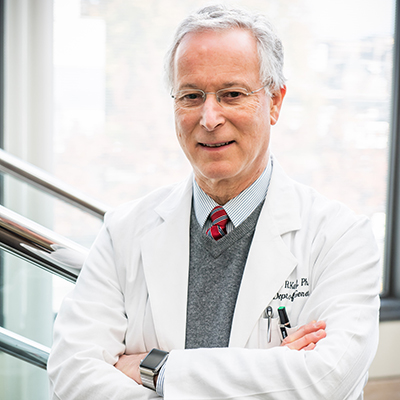Bruce Korf, M.D., Ph.D., FACMG, Associate Dean for Genomic Medicine and Distinguished Professor of Genetics at the University of Alabama at Birmingham (UAB), has been named the recipient of the 2024 American College of Medical Genetics (ACMG) Foundation for Genetic and Genomic Medicine’s David L. Rimoin Lifetime Achievement Award in Medical Genetics.

The award, the highest honor given by the ACMG Foundation, recognizes individuals with careers that have significantly contributed to the field of genetics and genomics, and whose characteristics embody that for whom the honor is named.
“Dr. Korf is a leader in our field, demonstrating true leadership in defining the medical discipline of genomics,” said ACMG Foundation President Nancy J. Mendelsohn, M.D., FACMG. “He is a dedicated teacher, championing genetics education and training, and an inspiring and devoted educator. He is an international leading authority as a clinician and scientist on the underlying pathophysiology, diagnosis and clinical care of patients with neurofibromatosis.”
Over the course of more than four decades of research, clinical practice, and service, Korf has authored more than 154 peer-reviewed publications, 92 non-peer-reviewed manuscripts, 60 book chapters and 18 books. Korf’s work has earned the respect of patients and colleagues alike, helping students who are pursuing their own contributions in genetics while consistently advocating for medical genetics education to be integrated into mainstream healthcare.
“Dr. Korf has been one of the most influential figures guiding my career, and I suspect there is a long line of clinicians and scientists out there who would say the same,” said J. Daniel Sharer, Ph.D., FACMG, a professor of clinical genetics in the UAB Department of Genetics. “He has been and remains one of the world’s leading authorities — both as a clinician and a scientist — on the underlying pathophysiology, diagnosis and clinical care of patients with neurofibromatosis.”
When learning that he was the 2024 recipient of the Rimoin Lifetime Achievement Award, Korf stated that he was surprised to receive the award but also humbled for having the honor bestowed upon him.
“Having an award that bears Dr. Rimoin’s name is also a particular honor and very meaningful, given our many years of collaboration on Principles and Practice of Medical Genetics and in the American College of Medical Genetics and Genomics,” Korf said.
A world-renowned neurofibromatosis (NF) expert, he is known for spearheading the effort to drive its evolution from clinical diagnosis and surveillance to the possibility of treatment. Korf’s research has contributed to providing new choices and hope to people with NF, and has been instrumental in coordinating multi-site research collaborations needed to ensure adequate participants in clinical trials for this rare disorder.
“If there's one thing that ties the clinic and the lab together, it's what I describe as a sense of urgency that patients feel,” Korf said. “Although it's a time-consuming and laborious process to get from understanding a mechanism behind NF to producing new therapies, there really is an urgency to do this, given the challenges that people and their families who live with these conditions face.”
Since joining UAB in 2003, Korf’s contributions to medical research have not just been limited to NF, as he leads UAB’s Undiagnosed Diseases Program, which is part of the National Institutes of Health’s (NIH) Undiagnosed Diseases Network, as well as leading two population-level genomics projects: the All of Us Southern Network, part of the NIH-led All of Us Research Program, and the Alabama Genomic Health Initiative, a statewide program.
He is also the editor-in-chief of the American Journal of Human Genetics and serves as principal investigator of the Neurofibromatosis Clinical Trials Consortium, a Department of Defense-funded research program that allows researchers around the country to pool administrative resources, share findings and recruit study participants.
“You go to the clinic and see that day’s patients, and then you go back to your office or go home and may think about other things, whereas the patients you're seeing take their condition home with them and live with it every minute,” Korf said.
“I have witnessed his compassion. He’s always pushing to get meaningful research data back to physicians and patients so patients can get the diagnosis and care that they need,” said Dr. Deeann Wallis, Ph.D., professor in the UAB Department of Genetics.
Dr. Korf’s research has made a significant contribution to understanding human health, and contemporaries are quick to recognize its overall impact.